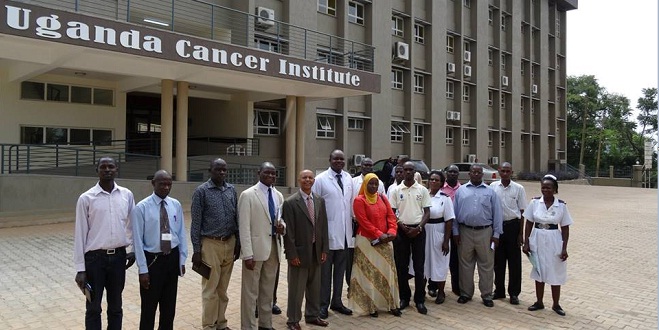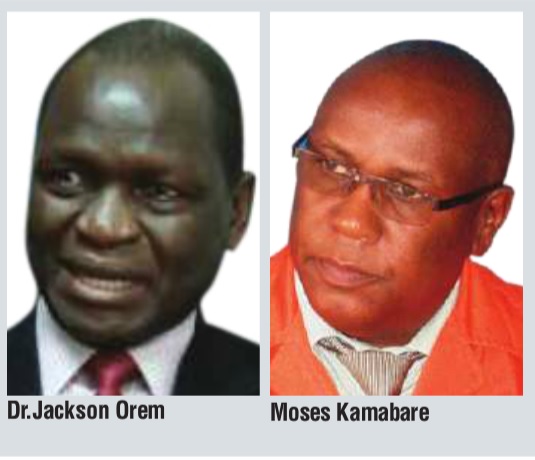
A visit to the Uganda Cancer Institute (UCI) is for the hard-hearted since a row broke out between its management and those of the National Medical Stores (NMS) and drugs stopped being delivered. Patients who are in need of drugs now lie around without help.
One of such patients is Lawrence Nsigalira who has been battling skin cancer for the last seven years. He has since been getting drugs free but not anymore.
“I was admitted at Mulago for a long time but when they started charging us for drugs – telling us to get them from pharmacies in Wandegeya I decided to go back home because I could no longer afford,” he says.
But going home is not an option for Patrick Mangeni; another patient who The Independent found at UCI on Sept.23. He said he would stay at the hospital until the drugs come.
The Independent has seen a draft of the audit report. It show that NMS caused government an annual loss of Shs2 billion through over pricing of cancer drugs and insufficient supply.
Mangeni bleeds because of advanced cancer of the rectum and uses a black polythene sheet as a mat says he has been at the Institute for about six months and has now resorted to begging to raise money to buy some of the drugs. “The doctor promised drugs will soon come. I can’t go back to Busia. Getting these painkillers I buy from Wandegeya will be hard,” he says.
Nsigalira and Mangeni are among the over 150,000 patients receiving treatment at the Institute whose life lies in a balance not sure of whether they will be able to get their next dose. Unfortunately even Dr. Jackson Orem, the Director at UCI seems not to know when exactly the supply of drugs will arrive consistently.
Orem says it all possibly depends on when a running conflict between the cancer institute and NMS, a government body mandated to procure and distribute these drugs will be resolved. Oremwho refused to explain the cause of conflict has been previously quoted in the media blaming NMS for causing drug shortages at UCI. He reportedly said NMS procures drugs at a price five times higher than the prevailing local and international market price yet under normal circumstances the price would be lower because NMS buys in bulk. He has also blamed NMS for procuring drugs of lower quality in addition to delaying to provide them when required.

“I am aware that patients sometimes go without drugs. I am also aware they are being told to buy them from pharmacies but I’ve decided to hold up until an official audit report about the issue is released,” Orem told The Independent. He added that the Ministry of Finance has commissioned an internal audit to look into the operations of the drug procuring body.
Audit raises queries
The Independent has seen a draft of the audit report. It show that NMS caused government an annual loss of Shs2 billion through over pricing of cancer drugs, provided insufficient supply, procured low quality drugs, and lacks an up to date stores ledger and failed to credit Shs587.7 million for overpriced Vincristine; a chemotherapy medication used to treat various cancers which they had supplied to the institute for three months.
When The Independent asked Moses Kamabare, NMS executive director, he denied the accusations saying the report is work of individuals looking towards frustrating their work. He said UCI has specifically proved hard to work with as they have continued rejecting the drugs procured cheaply and have instead been asking for those that are approved by the United States Food and Drugs Agency (USFDA).
“Who says USFDA drugs are the only ones of quality? We had contracts with suppliers who could offer us cheaper but quality. We dropped them because the drugs were rejected. For instance procuring Xeloda alone cost us more than Shs 500 million yet such a drug would cost a much lower price,” he said.
He said audits on their performance are done every year by different entities including the Auditor General and international bodies; like Global Fund.
“They claim the fraud has been going on for years. Audits are done every year. Why has it been escaping them,” he asks adding that the Ministry of Health and Office of the Prime Minister have intervened and agreed on certain issues that he said he could not reveal yet.
Kamabare also says whenever a technical error happens and is detected they rectify and credit the account as quickly as possible. If Kamabare is right, the question is why complaints from the cancer institute have not stopped and the ping pong continues.
Bukuya county legislator Dr. Micheal Bukenya, who is also Chairperson Health Committee of Parliament, says his committee has visited and listened to stories of both parties and they have summoned them together with their supervising Ministry of Health in order to come up with a final position.
Bukenya says the cancer institute is pushing for its independence.
“It should be given the autonomy to do its own procurements a solution that is housed in the Uganda Cancer Institute Bill 2015 which still awaits accent by the president,” says the MP for Bukuya County, “This seems to be what UCI is fighting towards but the Director Orem is not too brave to mention it.”
The leaked audit report also hints on UCI’s autonomy as one of the recommendations. It notes that it is irregular for NMS to budget for UCI’s drug and sundries needs because it cannot project the institute’s needs, the nature of cancers, and the increase in the number of patients. In the last financial year, the audit says, UCI required medicines and sundries worth Shs12.5 billion but NMS only approved a budget of Shs7 billion worth of drugs.
The Cancer Institute was this year allocated Shs41.3 billion – an increase of more than 152% as compared to FY 2015/2016 when it was allocated Shs7 billion but demands keep rising.
Currently, the prevalence of cancer in Uganda is between 80,000 and 100,000 people.
Of every 100,000 cancer patients, 200 will be newly diagnosed cases. 80% of all the people diagnosed with cancer die partly because of late diagnosis and also lack of appropriate treatment. For instance recently the breakdown of the radiotherapy machine at the institute caused and is still causing deaths as construction of the bunker to house a new machine has not got beyond ground breaking, a ceremony which was held in February.
****
editor@independent.co.ug
 The Independent Uganda: You get the Truth we Pay the Price
The Independent Uganda: You get the Truth we Pay the Price



